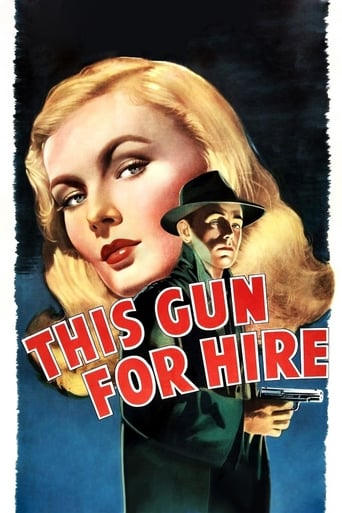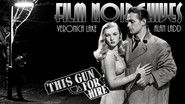Pjtaylor-96-138044
'This Gun For Hire (1942)' is a fantastic film-noir that pulls no punches, focusing on a cold-blooded killer who's as merciless as he is efficient. The title role is played with a detached, steely verve in a brilliant starring debut by Alan Ladd. He's never on the moral high-ground, he isn't being framed or anything like that, and in fact is presented with very few redeeming factors. Aside from, that is, a brief but powerful scene detailing his traumatic childhood, which is actually almost as unconventional as having such a blatantly brutal anti-hero in a 1940s piece. Though some war-time patriotism seeps in towards the end, it doesn't betray the tone created up until that point and the exciting climax maintains that violence begets violence unless a choice is made to stop it. 8/10
jakob13
Graham Greene's entertainment 'This Gun for Hire', in the hands of script writers Albert Maltz and W.R. Burnett, becomes an cog in the U.S. against fascism.
The narrative is transposed from the intrigues of pre-world war two Europe to California.
Director Frank Tuttle's is fast moving. It is film noir in its early childhood. We're in 1942, a few months after Imperial Japan's attack on Pearl harbor. The narrative moves from San Francisco to Los Angeles, in the early days massive removal of Japanese from principally California, Oregon and Washington, to internment camps.
'This gun for hire' is a tale of murder and political mayhem, of corporate greed and treason.
The film is notable for Alan Ladd's first major feature film, and a strong performance it is. He's Philip Raven, a hired killer who performs his craft with a stone-cold sober aplomb. Not a crease in his brow, an ice stare and a voice which betrays no inner emption or doubt. He is betrayed and set up for a fall by the msn who hired his gun. And so in true Greene fashion, Raven is both hunted and hunter, seeking revenge.
Although Ladd is given third billing, he is more than ably supported by Veronica Lake as a night club performer who fascinates by her unsentimental singing and her tricks as a quick-handed magician. And although there is a chemistry between her and Raven, it is without romantic passion. That is workman-like indicated by Robert Preston as the police man who is after Ladd. Laid Cregar is oleaginous and slippery as a craven eel who works for the Alvin Brewster who is eager to sell a poison gas formula to the Japanese. The storyline is not difficult to see how everything turns out. Good triumphs, the good fight won;t be poisoned by the gas an American chemist has created; Raven pays for his crime but has redeemed himself by unmasking the internal enemies. In hindsight, three-quarters a century after the film first flashed across the screen, it is easy to see Maltz (one of the Hollywood 10) and Burnett worked in tandem to come up with a script that exposed corruption, greed and in wartime, shone light on pre-war behavior of capitalists who put individual interest before national good in dealing with fascists like Hitler of the Japanese militarists, Franco or Mussolini. And what's more in wartime had not lost that habit. 'This gun for hire' turned Ladd into a major star. It was made for half a million and grossed $12 million. Curiously, in spite of its obviousness, the film has not lost the salt of low-keyed narrative, the darkness of ambiance, and a no nonsense school of film making. And Lake is eye fetching and holds her own.
disinterested_spectator
This movie is about a hired killer named Raven, and it uses a variety of means to make us like him. First, Raven is played by Alan Ladd, who is good looking, and we have a natural inclination to like good-looking people. Second, he has a cat for a pet, of which he is very protective, causing him to slap a maid when she runs the cat out of the room after it knocks over a can of milk. We tend to like people who like animals. True, we tend to not like men who slap women, but that is the sort of thing we would expect from a man who kills people for money. It is the positive qualities that he is given to make us like him, in spite of the negative ones that would ordinarily make us not like him, that are interesting.When he goes to an apartment where there is a man he is supposed to kill, he sees a little girl sitting on the stairs with her legs in braces, probably a victim of polio. He doesn't like the fact that she is a witness, but he continues on up the stairs. Once inside the room, he is dismayed by the presence of a woman. After he kills the man, he sort of apologizes to the woman, saying he was told the man would be alone, and then he shoots her too. The man he killed was a blackmailer, so we had no sympathy for him, but in killing the woman, who presumably was nothing more than a girlfriend of the blackmailer, Raven shows that he is not averse to killing someone who is innocent, if she happens to be a witness. As a result, we wonder if he will shoot the little girl too on his way back down the stairs. He is tempted, but takes pity on her and simply leaves after handing her the ball she dropped. That is another way the movie gets us to like him.Furthermore, the movie gives us another villain, Willard Gates, whom we are encouraged to despise. Gates is played by Laird Cregar, who just has the look and manner of someone creepy. He is the one who hired Raven to do the job. He pays Raven off in ten dollar bills, and then double-crosses him by giving the serial numbers to the police so that Raven will go to prison where he cannot talk. At least, that is the idea, but it really doesn't make sense, because the best way to keep a hit-man from talking to the police is by not double-crossing him. In any event, it turns out that Gates works for a chemical company that is selling a formula for poison gas to the Japanese during World War II. Compared to Gates, Raven seems to be a pretty good guy, for a hit-man.Ellen Graham, a showgirl, is enlisted by a senator to go undercover and investigate Gates and his company. This naturally results in her and Raven crossing paths. He almost kills her to keep her from talking, but she gets away. Eventually, they come to like each other, especially after he rescues her from Gates, who was planning to have her killed. Raven confides in her about dreams he keeps having of the woman who raised him as a child, who beat him regularly, and even hit him with a flatiron, deforming his wrist. This movie was made when psychoanalysis was familiar to audiences, who were therefore primed to accept childhood trauma as an explanation for mental problems later in life. Even today, we tend to accept this explanation for why Raven is the way he is, somewhat excusing his evil nature.Raven wants to get even with Gates and with Brewster, the man Gates works for, while Ellen wants to find out if those two men are traitors. This leads them to cooperate with each other, with Ellen telling Raven where he can find the two men. Brewster is an old man in a wheel chair, which makes him the third person in this movie with some kind of physical disability, but there does not appear to be any special significance about that. In any event, when Raven forces Brewster to sign a confession, the latter dies of a heart attack, after which Raven kills Gates. This is a common ploy of the movies, having the protagonist act from personal motives, which just happen to be of great help for the war effort. So this is another way the movie gets us to like Raven.Finally, Raven starts to shoot a police detective, but when he sees that he is Ellen's fiancé, he holds his fire. This consideration for her makes us like him some more. Then he is shot by a policeman and dies. Because his death is the proper punishment for the crimes he has committed, it balances the books, allowing us to like him without feeling guilty about it.
PamelaShort
It is easy to see how this film helped boost Alan Ladd's career to that of major star status. His performance as the ruthless, cold psychopathic hired killer is amazingly convincing. Ladd hits the mark in this challenging role, as he portrays Raven with the right mixture of callous disregard expected from the killer, and with startling moments displaying a full conscience of knowing the difference between whats right and wrong. Veronica Lake's role is full of depth, her character is far more than just a sex symbol and is an essential part of this story, as she is the only person able to pull some good out of Raven and she does so with her cool, alluring manner. Laird Cregar is perfectly cast as the neurotic betrayer, tangled up between Ladd and Lake. This film is dark noir and the slick scripting helps to move the story along at an agreeable pace. Miraculously the complex plot works fine, mainly due to the brilliant performances give by Alan Ladd, Veronica Lake and Laird Cregar!. This Gun for Hire also has a propaganda message, quite appropriate for 1942, but holds up well for todays audience. The black and white cinematography is excellent for setting the atmosphere and mood. I have always enjoyed this interesting and entertaining film noir and recommend it as a good choice for fans of noir genre. Worth noting this film is also Paramounts first successful pairing of Alan Ladd and Veronica Lake.




